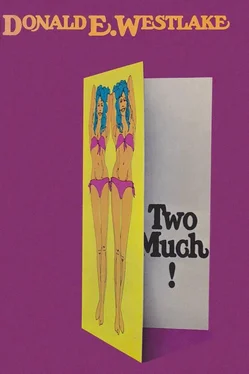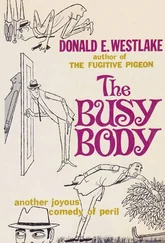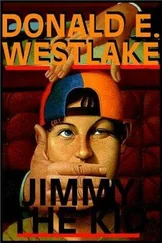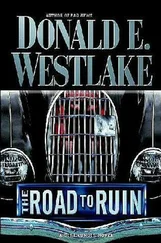His natural truculence was creased by a pleat of curiosity. “What is it?”
“I understand when you were born — three wise men left town.”
“Not bad,” he said.
“It’s encouragement like that keeps me going, Charlie.”
“What’s the picture?”
“The card is a photostat of a birth certificate.”
He frowned, not seeing it; in truth, it wasn’t a very good idea. “Yeah?” he said.
From the bottom left drawer of my desk I took the photostat of my birth certificate I’d sent for when I got my passport; you never know when you might want to leave the country. Extending it across the desk, I said, “We’ll use mine. That way, there won’t be any lawsuits.”
“Yeah?” He took the photostat and studied it, not charmed. “What do you need me for?”
“Well, I don’t want it exactly mine, do I? You’ve got gray inks for the background, white inks for the lettering, you can make a couple minor changes. So it’s sort of Everyman.”
His stubby finger poked the stat. “John Doe in here?”
“No, that’s too cute. We can leave my last name, it’s common enough, something you find around the garage. Change the first name, let’s see, something with six letters, hmmmmmmm...”
“Joseph?”
“Joseph Dodge.” I pondered that. “Joe Dodge. Wasn’t there somebody famous named Joe Dodge?”
“Was there?” Charlie in thought looked like a Bassett hound.
“How about...” I said, “how about Robert? That ought to fit.”
“Okay.”
“And listen,” I said. “Change the birth time. You know, let’s not give anything away to these astrology freaks.”
He frowned massively at me. “What?”
“Just do it, Charlie,” I said. “Think of it as a personal quirk.”
He shrugged. “If you say so. Any particular date?”
“Oh, leave the date,” I said airily. “No sense changing everything. Just make the birth time, oh, I don’t know, say twelve minutes later. And then the rest you can leave just the way it is.”
“So there’s just the two changes, right? Arthur to Robert, and five seventeen to five twenty-nine.”
“Right. When do you suppose you could have it?”
“When do you suppose I could get paid for it?”
“On delivery.”
If he frowned any deeper his head would crack open like a coconut. “You been robbin’ liquor stores?”
“I’m trying to maintain faith with my artists. When could you have it?”
“This afternoon. How much do I get for it?”
“Twenty-five.”
“Wrong. Forty.”
“For an hour’s work? Even hookers don’t get that much.”
“Thirty,” he said.
“I’m on a tight budget, Charlie,” I said. “If I have to go above twenty-five I won’t be able to pay you right away. I mean, if you’re willing to wait—”
“I’ll take the twenty-five,” he said.
Buzz.
“Hah?”
“Linda Ann Margolies is here.”
For just a second I was a complete blank. Linda what? Then my eye drifted past my desk clock, and I saw it was five after one, and it all came back to me: the Columbia gem, the master’s thesis on comedy. “Right,” I said, stuffing the rest of my pastrami-on-rye into a desk drawer, and hung up. I swigged down my coffee, underhanded the cup into the wastebasket, patted my mouth with the paper napkin, pocketed the napkin, got to my feet, and smiled a welcome as Gloria ushered in Linda Ann Margolies.
And when I saw her, I multiplied the smile by two.
Ah, yes, there are moments when I understand cannibalism. Food imagery kept filling my head as I looked at this lush morsel: home-baked pastry, crepes suzette, ripe peaches. If she were any shorter it would be too much, overblown, fit for a gourmand rather than a gourmet, but she was just tall enough to cool the effect slightly and thereby become perfect. Sex without loss of status, how lovely. “Come in, Miss Margolies,” I said, and ignored the jaundiced lip-curl of Gloria in the background.
Gloria left us, I gestured the student into the Volpinex-Hillerman Memorial Chair, and she said, “I do thank you for your time, Mr. Dodge. I know you’re a busy man.”
“Up with the sun and on the run,” I said, dropping back into my own chair.
She flashed a quick surprised smile. “Oh, yes! That’s the one from the prune advertisement.”
I was flabbergasted. “How in God’s name did you know that?”
“Just part of my thesis,” she said. Modest dimples parenthesized her modest smile. “I know them all.”
“I bet you don’t.”
“I’d love to hear a new one,” she said.
Frowning, I said, “Barbasol shaving cream. Woman in an evening gown holding a giant mock-up of the product.”
But she was already nodding and grinning. “Is your can too small? Try mine for size.”
“ Wall Street Journal ,” I challenged her.
“I upped my income five percent last year. Up yours.”
“Woman’s clothing store, um, uh, Peck and Peck.”
“There is a kind of woman,” this calm marvel said, “who would like to have a chauffeur six times a day.”
“Right,” I said. “So I’m here to interview you about comedy, is that it?”
She laughed: modest, polite, friendly. “I’ve been doing my homework.”
“I can see that. You sure you’re in the right place, lady?”
“Don’t downgrade yourself,” she told me. “Folksy Cards is at the top of its field.”
“The motto around this joint,” I said, “is Don’t Shit A Shitter. I know what field I’m in. Sex and violence tied to festive occasions.”
Pencil and steno pad appeared from her knapsack-size purse. “The interview has started.”
“Humor is like a fountain,” I said.
“That’s life. Are you a native New Yorker?”
I frowned at her. “What’s that got to do with comedy?”
“There are theories about the humorist as the outsider,” she said. “We can make it work both ways. If you were born and raised in New York City, you must feel isolated from the rest of the country: ergo, comedy. If you came from Kansas or somewhere, you feel isolated and rootless here in New York: ergo, comedy. I just want to know whether you go under Column A or Column B.”
“I go with the West Lake Duck.”
“Foreign or domestic?”
She was hard to shake. Shrugging, I said, “I grew up all over. You’ve heard the term Army brat?”
“Father a career man?”
“Right”
“Officer or enlisted man?”
“Another theory?”
“Of course.”
“Enlisted man,” I said.
“Of course,” she said, and wrote something down.
I glowered at her. “What do you mean, of course?”
“Those tied in to the power structure,” she told me, “don’t need comedy. That’s the theory, anyway. Parents alive or dead?”
“Ask me questions about comedy.”
She gave me a sharp, and then a very soft look. “I’m sorry,” she said, and she sounded like she meant it. “It’s easy to get lost in words, and lose the faces. All right, we’ll talk—”
“My father’s dead,” I said. “Coronary in a rowboat in Vermont, fishing, two years after he finished his thirty and retired. Mother hasn’t been heard from since fifty-nine, when she ran off with the Danish xylophonist from the NCO Club dance band at Vogelweh, Germany, taking Dad’s fifty-four Volkswagen but leaving behind her silver pumps.”
Miss Margolies studied me for a long silent moment of uncertainty, and then said, “Was all that on the level?”
“You’ve just learned something else about comedy,” I told her. “It causes paranoia.”
She was too cool to be surprised. She nodded, her mouth smiling while the frown line remained between her eyes. “All right,” she said. “Let’s talk about comedy. What is comedy, really?”
Читать дальше












